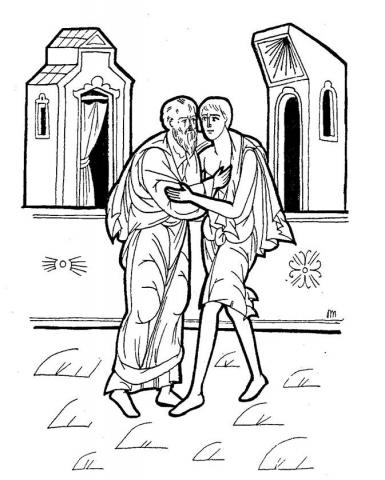Prodigal Son
THE PRODIGAL SON
 Objectives:
Objectives:
- Students should be able to tell the story of the Prodigal Son in their own words.
- Students should know that God forgives us even when we do something we shouldn’t.
Possible Lesson Plan:
- Open with prayer.
- Scripture Reference: Luke 15: 11-32. Where did the son go? What did he do with his money? Where did he end up, doing what? Why did he go back to his father? What did he say? What did his father say? Let’s look a bit at the older brother. He stayed at home, obedient. Where was he when the younger brother returned? What did he hear as he approached the house? How did he feel about all the celebration? Why? What did the father do when the older brother wouldn’t come to the party? What did the father say? How did the brother respond?
- Play a learning game: Word Jumble. Give each student a pad and pencil. Have your chalkboard or large tablet ready. Ask the question and then write the scrambled answer on the board. Give the students 30-60 seconds to write their answer on their tablet and go on to the next question:
(1) I was supposed to be given away when the THENECIARNI
father died. What am I?
(2) I left my family to go to the city. Who am I? GRAPOLID SNO
(3) I am a shortage of food. What am I? MEFNIA
(4) I gave the prodigal son a job. Who am I? GPI NOREW
(5) I was given to the prodigal son when he GIRN
returned. What am I?
(6) I forgave the prodigal son. Who am I? SHE TREAFH
(7) I did not waste my inheritance. Who am I? DOREL OSN
(8) I was called on to prepare a feast. Who am I? NEVSTAR
- Talk a bit about the words “I’m sorry”: These are powerful words. When do we say them? Have the children think of some times they have said them or heard someone else say them. What do we mean by saying “I’m sorry”? Did the Prodigal Son say, “I’m sorry”? How did the father respond? How do we respond when someone says they are sorry? Sometimes it’s not so easy to forgive. What if your friend broke your favorite toy and said, “I’m sorry”? Is it easy to forgive when the toy is still broken?
- Take a pigpen pledge: Review the story. The Prodigal Son was in the pigpen. He realized his sin and his father’s love – then he had to take a step. He had to get up and leave the pigpen and take a step towards his father! Picture this with the students. Then have each in preparation for Lent consider his or her own pigpen. What one single step can he or she take during Great Lent to move towards the Lord? Increased prayer time? Scripture reading each day? Lenten services? Improved fasting? Visiting the sick? Let each student actually write down the step he will take to draw nearer to the Father.
 Make a Piggy Bank: The teacher should make one, too, to be the class piggy bank. Take a gallon milk or juice plastic container. Turn it on its side so the handle is on top. Glue eyes just below the handle on both sides, 4 corks or bottle tops for feet, pink felt ears, and paper circles for spots all over the pig’s body. Twist a pipe-cleaner into a tail and poke it into the plastic behind. Draw on a mouth. Finally, cut a slit in the top for coins. All during Great Lent, we will each collect coins at home (from the sofa cushions, off the floor, by doing chores, etc.) and will bring them in to class to put in the class Piggy Bank to give to the IOCC at Pascha.
Make a Piggy Bank: The teacher should make one, too, to be the class piggy bank. Take a gallon milk or juice plastic container. Turn it on its side so the handle is on top. Glue eyes just below the handle on both sides, 4 corks or bottle tops for feet, pink felt ears, and paper circles for spots all over the pig’s body. Twist a pipe-cleaner into a tail and poke it into the plastic behind. Draw on a mouth. Finally, cut a slit in the top for coins. All during Great Lent, we will each collect coins at home (from the sofa cushions, off the floor, by doing chores, etc.) and will bring them in to class to put in the class Piggy Bank to give to the IOCC at Pascha.
- Close with prayer. Pray for each student to be faithful in his steps from the pigpen to the Father.
